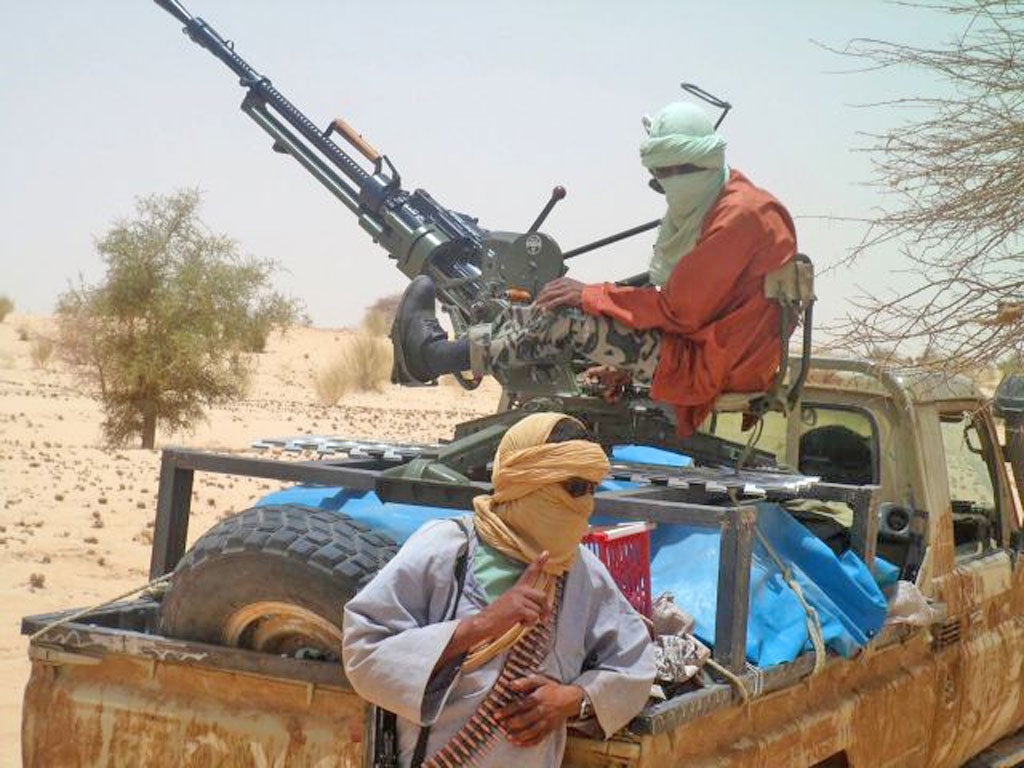Timbuktu begs: save us from al-Qa’ida
Mayor of historic city calls for foreign intervention to help fight militants

The mayor of Mali's Timbuktu has spoken of “desperate conditions” in the historic city and called for international intervention to liberate it from the control of Islamic militants linked to al-Qa'ida.
Halle Ousmane Cisse made the appeal as regional governments asked the United Nations Security Council for a mandate to put troops on the ground in the West African nation.
Mali has effectively been divided in two after Tuareg separatists declared independence in the north following a military coup in the south.
The rebels have since been usurped by Islamic militants who now control the three main cities.
“We ask the international community to quickly intervene,” said Mayor Cissé, speaking in the capital Bamako. He said that there was no way to negotiate with Islamists Ansar Dine and their allies in al-qa'ida in the Maghreb (AQIM). Force would be required even if it meant the further destruction of Timbuktu: “we will have to fight” said the mayor.
Mali's neighbours in the regional bloc, Ecowas, will seek a mandate this week from the UN for an invasion force to reconquer the north “within weeks”, according to Ivory Coast President Alassane Ouattarra.
Diplomats expect the force would include troops from Niger, Nigeria, and possibly Chad, as well as Mali itself, paid for by Western donors.
Mr Cisse said the economy in the fabled centre of Islamic scholarship has been destroyed along with many of the city's centuries' old monuments. The population was on the point of starvation and held out almost no hope that the bickering and ineffective junta – and its civilian partners in the south – would rescue it, he added.
“I do not believe in the power of the Malian army to solve this crisis because they deserted the cities (previously) leaving behind weapons that the rebels are now using against us.”
The plight of Timbuktu captured the world's attention when hardliners from the Ansar Dine guerrilla group began to demolish shrines and mausoleums which they claim violate their strict interpretation of Islam. There were howls of condemnation when fighters smashed the doors to the Sidi Yahya mosque in the city that had been left sealed as they lead to the famous “tomb of the saints”. Concerns have been mounting over the priceless troves of ancient manuscripts collected in Timbuktu dating back to the period when the city was a major centre of learning for the whole Saharan region.
The mayor said that most locals practice a moderate form of Sufi Islam and disagree with the Saudi-inspired Wahabbism that has prompted the campaign of vandalism. Mr Cisse said that people refused to follow the Sharia law imposed by the armed groups and would never support the “destruction of our sites”.
Mr Cisse, who came to Bamako to collect supplies, said the former tourist destination had been turned into a ghost town where many have fled and those who remain live in a climate of fear. Residents have organised demonstrations but have been warned that they risk being executed by the gunmen in charge: “We try not to give them opportunities to shoot at us,” said the mayor.
Mali, perched on the southern edge of the Sahara, has been overwhelmed this year by a sequence of crises that began with the fall of Colonel Gaddafi's regime in Libya. Regime change in Tripoli saw hundreds of fighters from the Tuareg ethnic minority pour back into northern Mali – many of them heavily armed and well trained soldiers who had fought for the late Libyan leader. Calling themselves the MNLA, they declared a new uprising against the government in Bamako which has long been accused of marginalising the majority Tuareg areas in the north.
Government forces were quickly routed, prompting a mutiny by troops in the capital and the emergence of a military junta. The international community has condemned the coup and refused to recognise the north's independence. However, attempts to get the junta to hand power to civilian authorities have largely failed. A new president was beaten up by junta supporters and fled to France only returning this weekend.
The prime minister, Cheikh Modibo Diarra, has attracted international support but appears to have little power.
Meanwhile in the north the Tuareg separatists of the MNLA have been swept aside by Islamic militants Ansar Dine, which is also Tuareg-dominated but with more hardline religious beliefs. Mayor Cisse said that non-Malian fighters have also arrived in Timbuktu belonging to the terror network AQIM – an al-Qa'ida affiliate that has been carrying out murders and kidnaps in the region.
An uneasy alliance of these two groups is now in charge of Timbuktu as well as the other main towns of Gao and Kidal.
While the population waits to see what help will come from the outside world there are mounting fears over food shortages. With a worse than usual Sahel food crisis underway and hundreds of thousands of people displaced by the security crisis food aid to the north is barely scratching the surface, the mayor warned.
Timbuktu was an important rice producer for the country and all farming activities have been halted, he said. “It will be a disaster if we do not farm this year in order to ensure self-sufficiency.”
Join our commenting forum
Join thought-provoking conversations, follow other Independent readers and see their replies
Comments
Bookmark popover
Removed from bookmarks